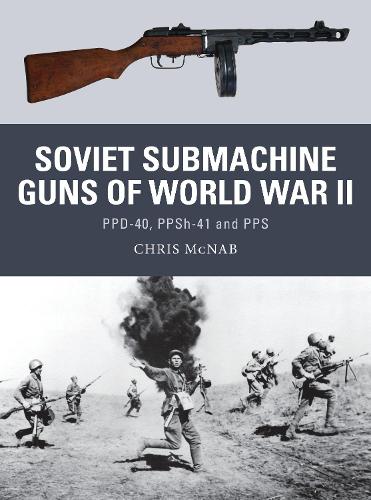
Soviet Submachine Guns of World War II: PPD-40, PPSh-41 and PPS
(Paperback)
Publishing Details
Soviet Submachine Guns of World War II: PPD-40, PPSh-41 and PPS
By (Author) Chris McNab
Illustrated by Mr Steve Noon
Illustrated by Alan Gilliland
Bloomsbury Publishing PLC
Osprey Publishing
20th May 2014
United Kingdom
Classifications
General
Non Fiction
Weapons and equipment
Ordnance, weapons technology
Militaria, arms and armour
355.82424
Physical Properties
Paperback
80
Width 178mm, Height 241mm, Spine 8mm
280g
Description
The submachine gun (SMG) came to be the embodiment of the Soviet fighting spirit during World War II. From 1943 the Red Armys preference for close-quarters combat resulted in entire infantry units being equipped with nothing but SMGs. By deploying multiple SMG-armed companies and battalions, the Red Army was able to develop ferocious firepower in urban warfare and position assaults, the soldiers keeping within the SMGs effective range of about 150m to nullify the German skills in armoured and manoeuvre warfare, artillery support and aerial bombardment. Featuring expert analysis and an array of specially commissioned full-colour artwork, this engaging study explains the history, use and development of Soviet wartime SMGs in detail. It gives particular focus to the tactical applications of these weapons in combat, and how they compared to firearms wielded by their German opponents. With numerous first-hand combat accounts, and detailed technical explanations, this book is ideal for both the general reader and the firearms enthusiast.
Reviews
"In characteristically clear-cut fashion, author Chris McNab's fascinating little handbook recaps three landmark designs: the PPD-40, PPSh-41 and PPS." --David L. Veres, www.cybermodeler.com
"...a superb book that is fascinating to read. A great addition to this series and one that I am positive you will enjoy. Highly recommended." --Scott Van Aken, www.modelingmadness.com (July 2014)
Author Bio
Chris McNab is an author and editor specializing in military history and military technology. To date he has published more than 40 books, including A History of the World in 100 Weapons (2011), Deadly Force (2009) and Tools of Violence (2008). He is the contributing editor of Hitler's Armies: A History of the German War Machine 1939-45 (2011) and Armies of the Napoleonic Wars (2009). Chris has also written extensively for major encyclopedia series, magazines and newspapers, and he lives in South Wales, UK. Steve Noon was born in Kent, UK, and attended art college in Cornwall. He's had a life-long passion for illustration, and since 1985 has worked as a professional artist. He has provided award-winning illustrations for the publishers Dorling Kindersley, where his interest in historical illustration began. Steve has illustrated over 30 books for Osprey. Born in Malaya in 1949, Alan studied photography/film and architecture, and has worked as a photojournalist and cartoonist. He also spent 18 years as the graphics editor of The Daily Telegraph, winning 19 awards in that time, including numerous UK Press Awards. He now writes, illustrates and publishes fiction (www.ravensquill.com), as well as illustrating for a variety of publishers (including Osprey, the Penguin Group, Brown Reference Group, Ivy Group and Aurum), architects and developers, such as John McAslan (Olympic Energy Centre) and Kit Martin (Prince Charles' Phoenix Trust advisor on historic buildings). www.alangilliland.com
